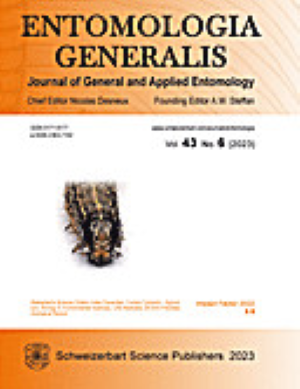Differential physiological effects of endo- and ecto-parasitoid venoms on the Asian citrus psyllid Diaphorina citri
IF 4.6
1区 农林科学
Q1 ENTOMOLOGY
引用次数: 0
Abstract
Two different species of solitary parasitoid wasps have been used as biological control agents for the Asian citrus psyllid Diaphorina citri: the endoparasitoid Diaphorencyrtus aligarhensis and the ectoparasitoid Tamarixia radiata. Since little information was available on the role of the venom of these two parasitoid species in their reproductive success, we set up experiments to compare the effect of natural parasitism, natural envenomation (which was possible for T. radiata) and microinjections of D. aligarhensis and T. radiata venoms on the development and behavior of D. citri nymphs. We found that natural or artificial envenomation by T. radiata rapidly inhibited the crawling behavior of D. citri nymphs and subsequently induced a high nymph mortality rate, mimicking the natural effect of parasitization. In contrast, microinjection of D. aligarhensis venom did not affect nymphal crawling and had no clear effect on nymphal development apart from a slight delay in the days following injection, which may be consistent with the need to keep the host alive during parasitoid larval development. These results demonstrated the differential effects of venom from two types of parasitoid species sharing the same host, improving our understanding of the evolution of Hymenoptera parasitism and highlighting the use of parasitoid’s venom as a potential source of bioinsecticidal molecules.内寄生虫毒液和外寄生虫毒液对亚洲柑橘木虱(Diaphorina citri)的不同生理影响
有两种不同种类的独居寄生蜂被用作亚洲柑橘蚜虫 Diaphorina citri 的生物控制剂:内寄生蜂 Diaphorencyrtus aligarhensis 和外寄生蜂 Tamarixia radiata。由于有关这两种寄生虫的毒液对其繁殖成功所起作用的信息很少,我们建立了实验来比较自然寄生、自然毒杀(T. radiata 有可能被毒杀)以及 D. aligarhensis 和 T. radiata 毒液的微注射对柑橘蓟马若虫的发育和行为的影响。我们发现,T. radiata 毒液的自然或人工注射会迅速抑制柠檬蝇若虫的爬行行为,并随后导致若虫的高死亡率,模拟了寄生的自然效应。与此相反,微量注射 D. aligarhensis 毒液不会影响若虫的爬行,而且除了注射后的几天略有延迟外,对若虫的发育也没有明显影响,这可能与寄生幼虫发育期间需要保持寄主存活一致。这些结果表明了两种寄生虫毒液对同一寄主的不同影响,加深了我们对膜翅目昆虫寄生进化的了解,并突出了寄生虫毒液作为生物杀虫分子潜在来源的用途。
本文章由计算机程序翻译,如有差异,请以英文原文为准。
求助全文
约1分钟内获得全文
求助全文
来源期刊

Entomologia Generalis
生物-昆虫学
CiteScore
7.10
自引率
18.80%
发文量
72
审稿时长
>12 weeks
期刊介绍:
Its scope covers all aspects of basic and applied research dealing with insects and more broadly with arthropods inhabiting wild, agricultural and/or urban habitats. The journal also considers research integrating various disciplines and issues within the broad field of entomology and ecology.
Entomologia Generalis publishes high quality research articles on advances in knowledge on the ecology and biology of arthropods, as well as on their importance for key ecosystems services, e.g. as biological control and pollination. The journal devotes special attention to contributions providing significant advances (i) on the fundamental knowledge and on sustainable control strategies of arthropod pests (including of stored products) and vectors of diseases, (ii) on the biology and ecology of beneficial arthropods, (iii) on the spread and impact of invasive pests, and (iv) on potential side effects of pest management methods.
Entomologia Generalis welcomes review articles on significant developments in the field of entomology. These are usually invited by the editorial board, but proposals may be sent to the Editor-in-Chief for preliminary assessment by the editorial board before formal submission to the journal. The journal also considers comments on papers published in Entomologia Generalis, as well as short notes on topics that are of broader interest.
 求助内容:
求助内容: 应助结果提醒方式:
应助结果提醒方式:


